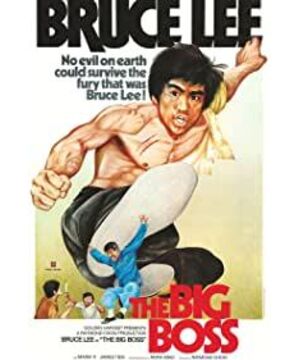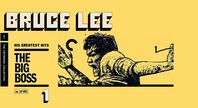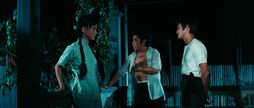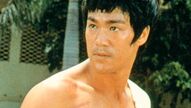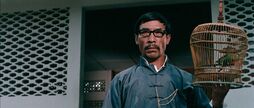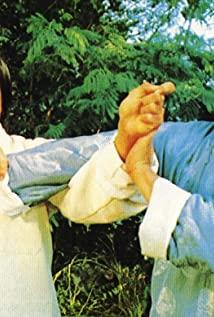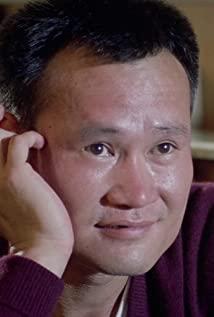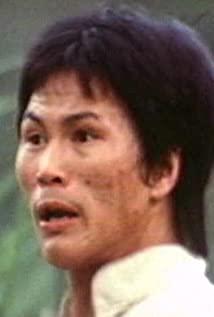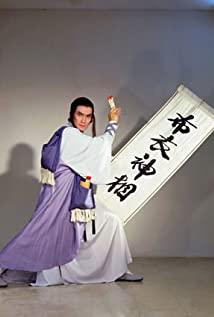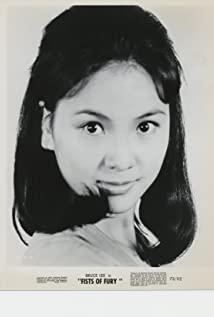October 31st is the 50th anniversary of the release of "Big Brother Tangshan". This article was supposed to be published that day, but I forgot it, so I am adding it here.
On July 20, 1973, Bruce Lee died. The Hong Kong media did not immediately notice this explosive news because the name Bruce Lee used in the hospital was his real name "Li Zhenfan".
Bruce Lee is so famous that everyone almost forgets that "Li Zhenfan" is his official Chinese name, and the Hong Kong media practitioners were no exception.
For people outside the Chinese-speaking world, "Bruce Lee" has always been "Bruce Lee", but for people in the Chinese-speaking world, "Bruce Lee" is not always "Bruce Lee". "Bruce Lee" was born in "Big Brother Tangshan" "(1971) before the release, and gradually became an international superstar after the release of "Big Brother Tangshan".
The birth of "Bruce Lee" is the product of the combination of historical inevitability and personal chance.
The so-called historical inevitability is that after western films and Japanese samurai films, the unique charm of "Chinese Kung Fu" is bound to be the international film scene.
Before Bruce Lee, there were very few opportunities for "Chinese Kung Fu" to be on the international stage. "Kung Fu movies" were at most a B-level film that made a handful of non-Chinese-speaking fans become fans.
When "Xia Nv" (directed by Hu Jinquan) was released in 1970, it was already 1975 when it shined at the Cannes Film Festival. At that time, Bruce Lee had passed away for two years, and with his death, the influence of "Chinese Kung Fu" in the world was getting bigger and bigger-this influence continued until Hollywood "introduced" martial arts instructors from Hong Kong. peak.
So why is Bruce Lee?
The so-called "opportunities are for those who are prepared", Bruce Lee is the one who is prepared.
Bruce Lee's father, Li Haiquan, is a famous Cantonese opera actress, so he can be regarded as a "star second generation" born in the showbiz.
It is the identity of the "star second generation" that allowed Bruce Lee to get the opportunity to act on the screen since he was a child-he is actually an actor born as a child star.
When Bruce Lee was three months old, he starred in "Golden Gate Girl" (1941) by Wu Jinxia, the first female director in the Chinese-speaking world. At that time, Bruce Lee was still in the United States and had not yet returned to Hong Kong. For the film directed by Wu Jinxia and her, please refer to the documentary "Golden Gate Silver Dream" (2013) directed by Wei Shiyu.
Bruce Lee left Hong Kong at the age of nineteen and went to study in the United States. Before he went to study in the United States, he had appeared in about 20 films in Hong Kong, and several of them were the protagonists. The performance experience can be said to be very rich.
Bruce Lee practised Taijiquan as a young boy. When he was a teenager, he worshipped Ye Wen as his teacher. He was a proper "kung fu boy". He also dabbled in other martial arts.
After going to the United States, after years of study and exploration, Bruce Lee combined Western martial arts, Japanese and Korean martial arts on the basis of "Chinese Kung Fu", and founded Jeet Kune Do. He became the "Master of Generation" at a young age.
In the mid-1960s, Bruce Lee began to venture into Hollywood as an actor and action director. He became famous for appearing in the TV series "The Green Hornet" (1966).
In addition, Bruce Lee is also a master of dance forest, won the Hong Kong Cha Cha Dance Open Championship in 1958.
All of the above are Bruce Lee's "preparations."
Bruce Lee's "opportunity" is not only his "opportunity", it is also the "opportunity" of Zou Wenhuai and Jiahe founded by him, and even the "opportunity" that followed the trend of Luo Wei-if not "discovered" and "named" Bruce Lee It is difficult for Rowe to leave a name in film history.
This "opportunity" once belonged to Run Run Run Shaw. At that time, Run Run Shaw did not know that the booming Shaw Films Company was actually going downhill. Run Run Run, who felt good about himself, rejected Bruce Lee's "bid." Later, he rejected the "offer" of Xu Guanwen and others, completely missing the "outlet" of the Hong Kong film transition, and accelerated the decline of Shaw Films.
In 1970, Zou Wenhuai, He Guanchang and Liang Feng left the Shaw Brothers and founded Jiahe.
The few films produced by Jiahe in its inception were not satisfactory in terms of quality and market performance. Jiahe's lack of excellent works, coupled with the suppression of the wealthy Shaw Brothers, before Bruce Lee appeared, Jiahe was on the verge of bankruptcy.
Zou Wenhuai signed a contract with Bruce Lee for two films with a remuneration of US$15,000. It can be said that it is a not-so-great gamble-US$15,000 is not a very high price, but Jiahe can't afford to lose.
The first director of "Big Brother Tangshan" was Wu Jiaxiang.
Soon after the shooting started, Wu Jiaxiang and Bruce Lee had an irreconcilable conflict.
At that time, most of the martial arts actors had a foundation in Peking opera or traditional martial arts. It was commonplace to play a few minutes in front of the camera according to "routines"—it can be said that martial arts actors who could not take long shots were unqualified.
Wu Jiaxiang asked Bruce Lee in the same way, but Bruce Lee did not take this set. Moreover, his Jeet Kune Do was fast, ruthless, and accurate, and he couldn't follow the "routine".
Wu Jiaxiang sued Zou Wenhuai and asked for a replacement.
Zou Wenhuai asked Bruce Lee to do "ideological work." Bruce insisted on his position and refused to compromise.
Between Bruce Lee and Wu Jiaxiang, Bruce Lee was definitely a bigger bet. Zou Wenhuai could only give it a go, so he fired Wu Jiaxiang and let Luo Wei take over as the director.
For Bruce Lee, the "opportunity" to appear in "Big Brother Tangshan" is indeed quite accidental.
In 1971, when Bruce Lee returned to Hong Kong, he actually planned to take his mother to live in the United States. Returning to Hong Kong for filming was not part of his original plan.
Although Bruce Lee has left Hong Kong for more than ten years, he is not a newcomer in the Hong Kong film world after all. At this time, he has made a name in the international martial arts world and Hollywood. His return will naturally arouse the attention of the industry.
Bruce Lee seems to have returned to his hometown, but he was actually not comfortable in the United States. He was burdened with a heavy mortgage in the United States, and his career as an actor and martial arts career did not bring him huge income.
After several contacts, you can not only give play to your strengths (starring in a martial arts film), but also get a good income (repay the mortgage), why not?
The martial arts instructor of "Big Brother Tangshan" is Han Yingjie. Han Yingjie also starred in the movie as the big villain-the owner of the ice rink.
Han Yingjie was a very important martial arts instructor in the Chinese film world in the 1960s and 1970s. He was also the imperial martial arts instructor of Hu Jinquan. He was also the son-in-law of the famous Peking opera martial artist Yu Zhanyuan. master.
Although Han Yingjie is the martial arts instructor of the film, Bruce Lee, who was supported by Zou Wenhuai, obviously gained the initiative in action design. His iconic actions include three feet, flying legs in the air, touching his nose, licking blood, grotesque calls, etc. They are all "finished" in "Big Brother Tangshan".
Bruce Lee basically abandoned the coherent tricks of Peking opera martial arts style, and replaced it with Jeet Kune Do's fast, ruthless, precise, and dance-like rhythm.
Bruce Lee did not take Han Yingjie upside down. The jumping action in the film is entirely Han Yingjie's style. This kind of action design can be seen everywhere in Hu Jinquan's works. The action design of the other actors in the film should also come mainly from Han Yingjie.
Unlike Sammo Hung and Jackie Chan, Bruce Lee has the so-called "Hong Family Class" and "Family Class", but many of the "teams" he brought out are the "background color" of the golden age of Hong Kong movies. In "Big Brother Tangshan", Liu Yong, Lin Zhengying, Tian Jun, Jiang Kun, Chen Huiyi, Chen Long and other supporting roles are familiar faces of Hong Kong movies in the 1970s and 1980s.
Luo Wei directed more than 50 films in his life, but few masterpieces were produced because he liked to follow the trend and lightly create.
In addition to classics such as "Big Brother Tangshan" and "Jing Wu Men" (1972), Rowe's greatest achievement is to give Bruce Lee and Jackie Chan a stage name that finally made them famous internationally.
Luo Wei contributed to the birth of "Bruce Lee".
After Bruce Lee's death, Rowe praised Jackie Chan - but Jackie Chan did not become popular in Rowe's hands. The so-called "Jackie Chan" means "becoming Bruce Lee". Jackie Chan's achievements in movies should surpass Bruce Lee.
Bruce Lee is a self-confident person who is almost arrogant. For this, you can refer to Quentin Tarantino's "smear" against him in "Once Upon a Time in Hollywood" (2019).
Before becoming famous, Bruce Lee once said a "big cow": "My clear goal is to become the highest paid super Eastern superstar in the United States. Starting in 1970, I will win a worldwide reputation. By 1980, I will be With a fortune of 15 million US dollars, my family and I will live a happy life at that time."
The first half of this "big cow", with the release of "Big Brother Tangshan", Bruce Lee came true.
Among Bruce Lee’s various commemorative sets of DVDs, "Big Brother Tangshan" is usually the first disc, and the CC version of Bruce Lee’s set is no exception—because it means the birth of "Bruce Lee"!
Finally, let us take the "copywriting" of the trailer of "Big Brother Tangshan" to see how Bruce Lee "went out":
"The founder of Jeet Kune Do, Bruce Lee, returns with his skills
Knowing the name for a long time, like Lei Guaner
Jeet Kune Do, only punches on two continents
Li three feet, three feet sweeping the western hemisphere
You can see the colors when you first enter the silver altar
Bruce Lee
Win glory for the country and eliminate harm for the people
Write about the struggle of an overseas Chinese leader
Simple and pure character, flesh and blood, and individuality. "
View more about The Big Boss reviews


